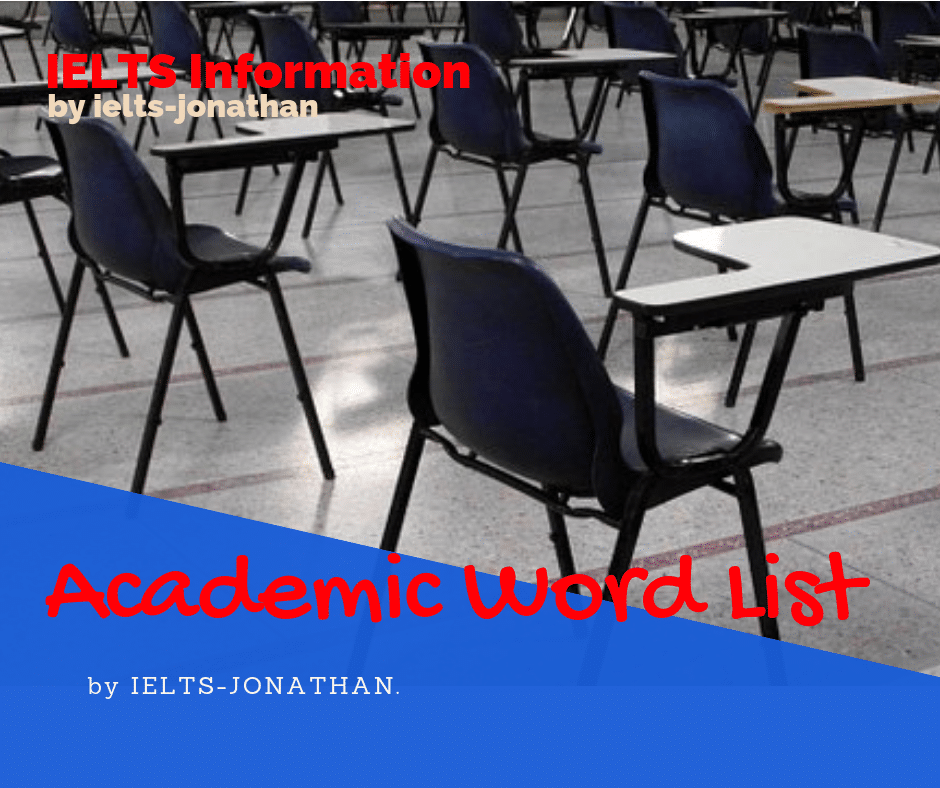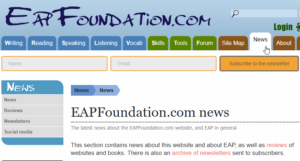Is academic vocabulary important in IELTS
You need a lot of vocabulary if you want to get a High Band Score in the IELTS exam, this means a good level of vocabulary you can use in all sections of the test.
Ways to learn useful academic vocabulary for IELTS
If you are still learning vocabulary, it’s a sensible idea to prioritise what kind of vocabulary you spend your time learning.
Common vocabulary for IELTS can be found in any section of the IELTS test. This is the vocabulary that makes up the 2000 words you need to understand most frequent situations in English.
Most textbooks focus their vocabulary on particular topics which come up frequently in the IELTS exam, such as the environment, health, society and family, the media, medicine, technology or education for example.
These are good ways to build topic specific IELTS vocabulary and is a very useful way of organising vocabulary; however, this should definitely be combined with studying something else.
The Academic Word List for IELTS (AWL) for IELTS
This is really useful if you already have a good command of English or you are a native speaker as it indicates the kind of language you would expect in academic writing and an academic IELTS essay. It could be regarded as essential, high-level IELTS vocabulary.
What Is the Academic Word List
The Academic Word List are words taken from an analysed database of academic English.
The academic word list used in this IELTS list is a collection the 570 words which most frequently appear in academic English across a wide range of academic fields and subjects.
Why use an academic word list in IELTS preparation.
So, if you were to select an IELTS reading text and compare it against the Academic Word List, you could find that words which appear in the AWL could be found in almost any sentence.
In fact, learning the 570 words on the list, plus a 2,000-word basic vocabulary would mean you have a far better chance of understanding at least 90% of any academic text, and therefore the majority of IELTS reading and listening texts.
‘Research has shown that the AWL covers 10% of words in academic texts; if you are familiar with words in the GSL (which covers around 80% of words in texts), you would have knowledge of approximately 90% of words in academic texts. ‘ https://www.eapfoundation.com/vocab/academic/awllists/ Accessed 18/10/2020
What to do about unknown words in IELTS
Of course, there will always be words that are unfamiliar or completely unknown and words that are so specialised it would be pointless to learn them.
Back to those 570 words.
570 may sound like a larger number and may seem like a lot of new vocabulary but you might be surprised how many words you already know from the academic word list.
You can find the list at the bottom of this page.
A good way to record this vocabulary, or indeed any vocabulary that you find through reading or listening, is to use the Cornell Note Taking method.
Further Resources
Here are a few websites which you might find useful to help you learn and practise the list:
Use this resource to gamify the leaning of vocabulary from the Academic Word List
Academic Word List Practice and Games
Use this to check the pronunciation and find related word forms and collocations
To sum up
In order to do well in the Academic Test, it’s important to have a good understanding of academic words which will add to your writing and also help you in reading and listening.
Don’t learn them by heart, but be aware of relationships and groups to help deal with understanding ideas and producing better written responses.
Academic Word List 1
Analysis – analyse, analysed, analyser, analysers, analyses, analysing, analyst, analysts, analytic, analytical, analytically
Approach – approachable, approached, approaches, approaching, unapproachable
Area – areas
Assessment – assess, assessable, assessed, assesses, assessing, assessments, reassess, reassessed, reassessing, reassessment, unassessed
Assume – assumed, assumes, assuming, assumption, assumptions
Authority – authoritative, authorities
Available – availability, unavailable
Benefit – beneficial, beneficiary, beneficiaries, benefited, benefiting, benefits
Concept – conception, concepts, conceptual, conceptualisation, conceptualise, conceptualised, conceptualises, conceptualising, conceptually
Consistent – consist, consisted, consistency, consistently, consisting, consists, inconsistencies, inconsistency, inconsistent
Constitutional – constituencies, constituency, constituent, constituents, constitute, constituted, constitutes, constituting, constitution, constitutions, constitutionally, constitutive, unconstitutional
Context – contexts, contextual, contextualise, contextualised, contextualising decontextualised,
Contract – contracted, contracting, contractor, contractors, contracts
Create – created, creates, creating, creation, creations, creative, creatively, creativity, creator, creators, recreate, recreated, recreates, recreating
Data – data
Definition – definable, define, defined, defines, defining, definitions, redefine, redefined, redefines, redefining, undefined
Derived – derivation, derivations, derivative, derivatives, derive, derives, deriving
Distribution – distribute, distributed, distributing, distributional, distributions, distributive, distributor, distributors, redistribute, redistributed, redistributes, redistributing, redistribution
Economic – economical, economically, economics, economies, economist, economists, economy, uneconomical
Environment – environmental, environmentalist, environmentalists, environmentally, environments
Established – disestablish, disestablished, disestablishes, disestablishing, disestablishment, establish, establishes, establishing, establishment, establishments
Estimate – estimated, estimates, estimating, estimation, estimations, over-estimate, overestimate, overestimated, overestimates, overestimating, underestimate, underestimated, underestimates, underestimating
Evidence – evidenced, evident, evidential, evidently
Export – exported, exporter, exporters, exporting, exports
Factors – factor, factored, factoring
Financial – finance, financed, finances, financially, financier, financiers, financing
Formula – formulae, formulas, formulate, formulated, formulating, formulation, formulations, reformulate, reformulated, reformulating, reformulation, reformulations
Function – functional, functionally, functioned, functioning, functions
Identified – identifiable, identification, identifies, identify, identifying, identities, identity, unidentifiable
Income – incomes
Indicate – indicated, indicates, indicating, indication, indications, indicative, indicator, indicators
Individual – individualised, individuality, individualism, individualist, individualists, individualistic, individually, individuals
Interpretation – interpret, interpretations, interpretative, interpreted, interpreting, interpretive, interprets misinterpret, misinterpretation, misinterpretations, misinterpreted, misinterpreting, misinterprets,
Involved – involve, involvement, involves, involving, uninvolved
Issues – issue, issued, issuing
Labour – laboured, labouring, labours
Legal – illegal, illegality, illegally, legality, legally
Legislation – legislate, legislated, legislates, legislating, legislative, legislator, legislators, legislature
Major – majorities, majority
Method – methodical, methodological, methodologies, methodology, methods
Occur – occurred, occurrence, occurrences, occurring, occurs reoccur, reoccurred, reoccurring, reoccurs
Percent – per cent, percentage, percentages
Period – periodic, periodical, periodically, periodicals, periods
Policy – policies
Principle – principled, principles, unprincipled
Procedure – procedural, procedures, proceed, proceeded, proceeding, proceedings, proceeds
Process – processed, processes, processing
Required – require, requirement, requirements, requires, requiring
Research – researched, researcher, researchers, researches, researching
Response – respond, responded, respondent, respondents, responding, responds, responses, responsive, responsiveness, unresponsive
Role – roles
Section – sectioned, sectioning, sections
Sector – sectors
Significant – insignificant, insignificantly, significance, significantly, signified, signifies, signify, signifying
Similar – dissimilar, similarities, similarity, similarly
Source – sourced, sources, sourcing
Specific – specifically, specification, specifications, specificity, specifics
Structure – restructure, restructured, restructures, restructuring, structural, structurally, structured, structures, structuring, unstructured
Theory – theoretical, theoretically, theories, theorist, theorists
Variables – invariable, invariably, variability, variable, variably, variance, variant, variants, variation, variations, varied, varies, vary, varying
Academic Word List 2
Achieve – achievable, achieved, achievement, achievements, achieves, achieving
Acquisition – acquire, acquired, acquires, acquiring, acquisitions
Administration – administrate, administrates administrations, administrative, administratively, administrator, administrators
Affect – affected, affecting, affective, affectively, affects, unaffected
Appropriate – appropriacy, appropriately, appropriateness, inappropriacy, inappropriate, inappropriately
Aspect – aspects
Assistance – assist, assistant, assistants, assisted, assisting, assists, unassisted
Categories – category, categorisation, categorise, categorised, categorises, categorising, categorizing
Chapter – chapters
Cite – citations
Commission – commissioned, commissioner, commissioners, commissioning, commissions
Community – communities
Complex – complexities, complexity
Computer – compute, computation, computational, computations, computable, computed, computerised, computers, computing
Conclusion – conclude, concluded, concludes, concluding, conclusions, conclusive, conclusively inconclusive, inconclusively
Conduct – conducted, conducting, conducts
Consequences – consequent, consequence, consequently
Construction – construct, constructed, constructing, constructions, constructive, constructs reconstruct, reconstructed, reconstructing, reconstruction, reconstructs
Consumer – consume, consumed, consumers, consumes, consuming, consumption
Credit – credited, crediting, creditor, creditors, credits
Cultural – culture, culturally, cultured, cultures, uncultured
Design – designed, designer, designers, designing, designs
Distinction – distinct, distinctions, distinctive, distinctively, distinctly, indistinct, indistinctly
Elements – element
Equation – equate, equated, equates, equating, equations
Evaluation – evaluate, evaluated, evaluates, evaluating, evaluations, evaluative, re-evaluate, re-evaluated, re-evaluates, re-evaluating, re-evaluation
Features – feature, featured, featuring
Final – finalise, finalised, finalises, finalising, finality, finally, finals
Focus – focused, focuses, focusing, refocus, refocused, refocuses, refocusing
Impact – impacted, impacting, impacts
Injury – injure, injured, injures, injuries, injuring, uninjured
Institute – instituted, institutes, instituting, institution, institutional, institutionalise, institutionalised, institutionalises, institutionalising, institutionally, institutions
Investment – invest, invested, investing, investments, investor, investors, invests reinvest, reinvested, reinvesting, reinvestment, reinvests
Items – item, itemisation, itemise, itemised, itemises, itemising
Journal – journals
Maintenance – maintain, maintained, maintaining, maintains
Normal – normalisation, normalise, normalised, normalises, normalising, normality, normally abnormal, abnormally,
Obtained – obtain, obtainable, obtaining, obtains, unobtainable
Participation – participate, participant, participants, participated, participates, participating, participatory
Perceived – perceive, perceives, perceiving, perception, perceptions
Positive – positively
Potential – potentially
Previous – previously
Primary – primarily
Purchase – purchased, purchaser, purchasers, purchases, purchasing
Range – ranged, ranges, ranging
Regulations – regulate, regulated, regulates, regulating, regulation, regulator, regulators, regulatory, deregulated, deregulates, deregulating, deregulation, unregulated
Relevant – irrelevance, irrelevant, relevance
Resident – reside, resided, residence, residential, residents, resides, residing
Resources – resource, resourced, resourceful, resourcing, resourcefulness, under-resourced
Restricted – restrict, restricting, restriction, restrictions, restrictive, restrictively, restricts, unrestricted, unrestrictive
Security – secure, insecure, insecurities, insecurity, secured, securely, secures, securing, securities
Sought – seek, seeking, seeks
Select – selected, selecting, selection, selections, selective, selectively, selector, selectors, selects
Site – sites, situation, situational, situated
Survey – surveyed, surveying, surveys
Text – texts, textual
Traditional – tradition, non-traditional, traditionalist, traditionally, traditions
Transfer – transferable, transference, transferred, transferring, transfers
You can get a PDF copy of this Academic Word List for IELTS here.
For further study, and further Academic English for university study, I always recommend the EAP Foundation website by Shelden Smith.
I’m Jonathan
I’ve taught IELTS and University English in more than a dozen universities and schools around the world.
I’m a parent, traveller and passionate about language teaching and helping students achieve their dreams.
Whilst living in Austria or working in Asia, I run IELTS courses to help students get to where they want to be.
If you are serious about IELTS, connect with me to see how I can help you.

The Best Approach to Task 2 Writing
Paragraphing in Task 2 Writing
Writing – Benefits of a Foreign University Education




Was this helpful? Leave a comment :)